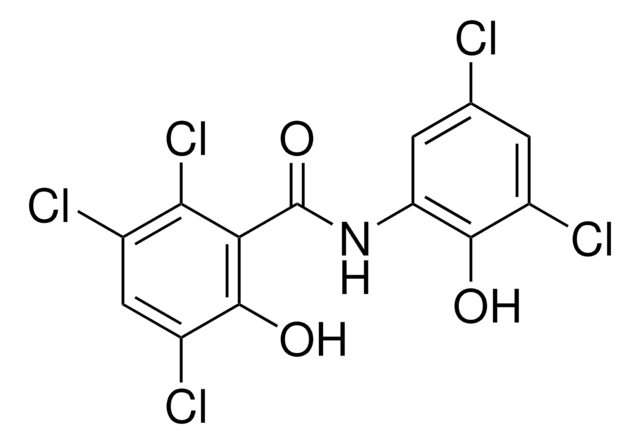D3000000
Doxycycline hyclate
European Pharmacopoeia (EP) Reference Standard
Synonym(s):
Doxycycline hydrochloride hemiethanolate hemihydrate
About This Item
Recommended Products
grade
pharmaceutical primary standard
Agency
EP Reference Standard
API family
doxycycline
manufacturer/tradename
EDQM
application(s)
pharmaceutical (small molecule)
format
neat
storage temp.
2-8°C
SMILES string
Cl[H].Cl[H].[H]O[H].CCO.C[C@@H]1C2[C@H](O)C3[C@H](N(C)C)C(O)=C(C(N)=O)C(=O)[C@@]3(O)C(O)=C2C(=O)c4c(O)cccc14.C[C@@H]5C6[C@H](O)C7[C@H](N(C)C)C(O)=C(C(N)=O)C(=O)[C@@]7(O)C(O)=C6C(=O)c8c(O)cccc58
InChI
1S/2C22H24N2O8.C2H6O.2ClH.H2O/c2*1-7-8-5-4-6-9(25)11(8)16(26)12-10(7)17(27)14-15(24(2)3)18(28)13(21(23)31)20(30)22(14,32)19(12)29;1-2-3;;;/h2*4-7,10,14-15,17,25,27-29,32H,1-3H3,(H2,23,31);3H,2H2,1H3;2*1H;1H2/t2*7-,10?,14?,15-,17-,22-;;;;/m00..../s1
InChI key
HALQELOKLVRWRI-ZVACAFRPSA-N
Looking for similar products? Visit Product Comparison Guide
General description
Application
Biochem/physiol Actions
Activity Spectrum: Effective against a broad spectrum inhibitor of matrix metalloproteinases in vivo.
Packaging
Other Notes
related product
Signal Word
Warning
Hazard Statements
Precautionary Statements
Hazard Classifications
Acute Tox. 4 Oral - Aquatic Chronic 3 - Eye Irrit. 2 - Repr. 2 - Skin Irrit. 2 - STOT SE 3
Target Organs
Respiratory system
Storage Class Code
11 - Combustible Solids
WGK
WGK 3
Flash Point(F)
Not applicable
Flash Point(C)
Not applicable
Choose from one of the most recent versions:
Certificates of Analysis (COA)
Sorry, we don't have COAs for this product available online at this time.
If you need assistance, please contact Customer Support.
Already Own This Product?
Find documentation for the products that you have recently purchased in the Document Library.
Customers Also Viewed
Our team of scientists has experience in all areas of research including Life Science, Material Science, Chemical Synthesis, Chromatography, Analytical and many others.
Contact Technical Service







